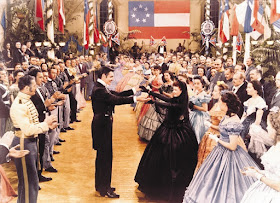This Tuesday marked the anniversary of the
1936 publication of Margaret Mitchell’s Civil War-era epic Gone with the
Wind, one of the bestselling novels of all time, which also became one of
the most beloved movies of all time. But in light of its nostalgic view of
Southern slave-owning society, has this classic become a racist relic that must
be shunned in our time?
Gone with the Wind has sold tens of millions of copies. Its
author Mitchell won the 1937 Pulitzer Prize for Fiction, and the David O.
Selznick-produced film starring Vivien Leigh as tenacious Atlanta belle Scarlett
O’Hara and dashing Clark Gable won eight Oscars (out of 13 nominations) and is
still the most successful film in box office history (when adjusted for
inflation). It was number six on the American Film Institute’s 10th
Anniversary Top 100 American Movies of All Time in 2007. Up until a week or so
ago, few people would have denied it that celebrated place in history and in
the hearts of movie lovers everywhere.
But that was before the shocking massacre of
nine members of an historically black church in Charleston, South Carolina, at
the hands of a white supremacist. In the wake of that atrocity, public
revulsion for the Confederate battle flag, with which the murderer had posed in
personal photos, led to hysteria about banishing that symbol of American
slavery from view – no matter where or in what context it was found.
Not only were there calls to remove it from
government building flagpoles across the South, but Amazon, eBay, and retailers
from Sears to Walmart banned merchandise with its image. Apple withdrew
historical video games and apps featuring the image from circulation. Even more
irrationally, TV Land pulled reruns of The
Dukes of Hazzard from its lineup, and the replica iconic car from that
1980s show, with a Confederate symbol on its hood, will no longer be sold.
The rush to put a “banned-aid” on America’s
re-opened racial wounds didn’t end there. The New York Post’s Lou Lumenick wrote an op-ed last week titled, “‘Gone with the Wind’ should go the way of the
Confederate flag,” in
which he argued that,
If the Confederate flag is finally going
to be consigned to museums as an ugly symbol of racism, what about the
beloved film offering the most iconic glimpse of that flag in American culture?
While not “as blatantly and virulently racist
as D.W. Griffith’s Birth of a Nation,’’ Lumenick
wrote, Gone with the Wind’s “more
subtle racism’’ is even “more insidious,” romanticizing as the movie does the
institution of slavery, and painting the Civil War as a noble lost cause.
Lumenick acknowledges the great qualities
about GWTW, including “its gorgeous
Technicolor photography and its unforgettable performances” not only by Leigh
and Gable but by Hattie McDaniel, the first black performer to win an Oscar.
But he wonders, “[W]hat does it say about us as a nation if we continue to
embrace a movie that, in the final analysis, stands for many of the same things
as the Confederate flag..?”
While not calling for an outright ban on the
film, he concludes that this “undeniably racist artifact” should be consigned
to the dust heap of history along with the Confederate flag. I’m reminded of
efforts to do the same with the novels of Mark Twain because they feature
characters who casually use the N-word, which was in common use at the time but
which virtually everyone but the rap industry and marginalized pockets of white
trash finds abhorrent today.
Thankfully, Lumenick’s argument and such
extreme examples of excising the Confederate battle flag from history were met
largely with cries of disapproval, and even with accusations that they
resembled Orwellian-style revisions of history.
History is what it is – or rather, what it
was. We cannot change it, obviously, but neither should we deny it, rewrite it,
or delete “unacceptable” aspects of it from our cultural consciousness. Even as
just a symbolic response, condemning educational Civil War games, The Dukes of Hazzard, and Gone with the Wind in response to the
Charleston shooting was a childish and pointless gesture.
This is not to say that each of us shouldn’t be
allowed to make our own moral judgments of art, as well as aesthetic ones. But
there is a danger in banishing works of art of which ruling elites have capriciously
declared that we should no longer approve. We must have the sense and
sensibility to recognize that historical novels or movies are born of their
time and place.
To expect works of art to conform to
politically correct sensibilities, and to remove them from sight when they do
not, is a cowardly and even totalitarian act which also exposes a fear and incomprehension
of art. To allow shifting socio-political blind spots to obscure our vision
leaves us all less enlightened about not only the past, but ourselves.
From Acculturated, 7/2/15
